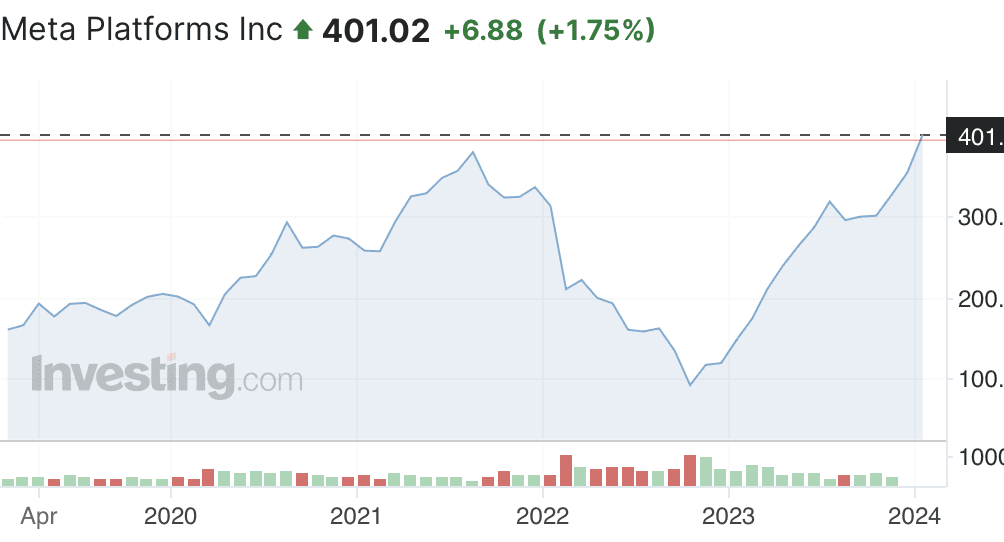Until six months ago, the Magnificent Seven was a film. And though there were once the Seven Sisters, these seven companies which dominated the global energy industry – and the stock market – have long faded in prominence.
But the exceptional growth in seven mainly technology stocks during 2023 has seen them take the title. Taken together, the stock value of Amazon, Alphabet/ Google, Apple, Meta, Microsoft, Nvidia and Tesla more than doubled last year.
At the end of the year, these seven companies comprised 27% of the entire value of the US S&P 500 index (creating a question along the way for many index investors about their level of diversification).
What’s driving the performance of the Magnificent Seven?
You can put this share price performance down to two main factors, one short-term, the other enduring.
Firstly, there was a recovery in tech valuations after a punishing 2022. For example, while Meta roughly tripled in value during 2023, it was only this month that it surpassed its previous market high of September 2021 as you can see in the chart.

Secondly, there was a strong market reaction to the prospects of a revolution in artificial intelligence, prompted by the launch of ChatGPT model in November 2022. The excitement around AI was led by Nvidia, up 239% in a year, driven by a wave of demand for its powerful chips.
And AI is what links these seven companies in 2024, and will determine if they can turn in similar growth levels in the future.
But in reality these businesses are quite different. Digging down a layer helps
Nvidia is ultimately a pick-and-shovel play: it’s a bet that there will be massive demand for their processors to support development of artificial intelligence – and you don’t need to decide who will be using them. So far that’s been the case, and demand for Nvidia’s product has been extraordinary.
But other semiconductor companies like Broadcom and TSMC – as well as users such as Google and Microsoft – are investing heavily in designing AI-oriented chips too, and over time will surely grab their share of the pie.
Microsoft (via OpenAI), Meta (via Llama2) and Google (via Gemini) have emerged as the leaders in large language models – software that can imbibe vast quantities of the written word and repurpose it to to produce text in response to questions and so forth
Tesla is presently a car company. But it has ambitions to apply artificial intelligence in self-driving and robotics applications. Its Elon Musk has said he is “uncomfortable growing Tesla to be a leader in AI & robotics without having ~25% voting control”, creating a key risk around the company in this sector.
Amazon and Apple are perhaps the biggest outliers, their performance more caught up in a recovery of tech share prices than an artificial intelligence revolution.
For these businesses, the opportunity seems to be mostly about integrating or enhancing artificial intelligence within existing products. For example, Apple could deploy a large language model locally on its phones, rather than relying on cloud servers, putting AI into the pockets of billions of consumers.
2024: time for a broader-based performance
Momentum is a strong factor in financial markets, but 2024 looks like a year where other business’s share values can catch up, for three main reasons
Firstly, valuations among the Magnificent Seven mean that a lot has to go well to justify them. At the top end, Nvidia is trading on around 80 times earnings. In contrast, the global stock market is trading at around 20 times.
What does the PE ratio mean? Put simply, if Nvidia never grew its earnings from here, it would take 80 years to get back the price you’re paying for the shares. Of course, the market expects Nvidia will grow its profits massively, which is why it attributes such a high rating to the shares.
Point is, on a valuation like Nvidia’s, there’s not much room for error.
To take another example, when Tesla announced disappointing sales growth forecasts on 25 January, more than 12% was wiped from its shares. Tesla’s share price has fallen around a quarter since the beginning of the year, and it’s now less than half its peak in late 2021.
So the Magnificent Seven are not the only show in town. In fact, it’s easy to point to other areas with strong prospects, from pharmaceuticals (for example those with new weight-loss therapies) to other beneficiaries of AI (such as Broadcom), to financial services (like Visa, up more than 20% in 2023).











You must be logged in to post a comment.